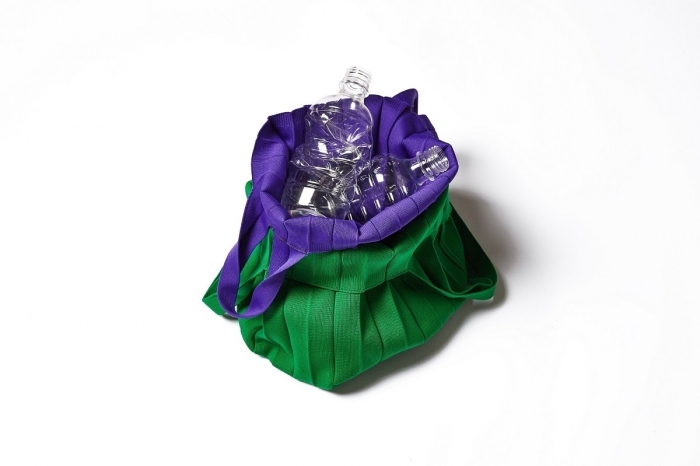[#WeFace] Breathing fashion into trash
Fashion industry sees new future in piles of waste
By Im Eun-byelPublished : April 15, 2021 - 14:52

Fashion often comes at a cost to our Earth.
Massive amounts of clothing and textiles are wasted each year, as brands launch new looks and collections each season and are unable to more efficiently control inventory.
According to the United Nations Economic Commission for Europe’s report in 2018, nearly 20 percent of global wastewater is produced by the fashion industry. The industry also accounts for 10 percent of global carbon emissions.
To grow a kilogram of cotton, for example, 7,500-10,000 liters of water is required, not to mention the carbon emissions needed to deliver the cotton to the factory, the energy to run the machines and more.
Sometimes, ethically conscious fashion movements can backfire. The fake fur trend, for instance, initially began as part of veganism, to protect and respect animal rights. Most fake fur items, however, are not biodegradable.
Aware of such damage to the environment, the fashion industry has tried efforts to be more sustainable.
For example, French luxury fashion house Hermes -- recognized for its dedication to authentic leather goods – has announced the release of a new travel bag made with a mushroom-based vegan leather alternative.
The Paris-based fashion label has partnered with California-based startup MycoWork, which has patented a process to transform mycelium, a network of threads from the root structure of mushrooms, into a leather-like material.
Local fashion labels are also taking part in the upcycling movement -- making yarn out of used plastic water bottles.
In March, the Seoul Metropolitan Government announced the release of clothing and bags made with recycled fiber from bottles collected across the Seoul area.
The Love Seoul collection, designed by local eco-fashion brand Pleats Mama, featured leggings, hoodies, eco-bags and more, made with recycled polyester fibers from transparent plastic bottles.
Hyosung TNC, the fiber production unit of Hyosung Group, partnered for the project, manufacturing recycled polyester fibers from the bottles. Sixteen 500-milliliter Samdasoo bottles can make one eco-friendly bag, the company said.
The recycling of plastic bottles to create fibers used to make sportswear is happening across the fashion scene.
US brand The North Face in Korea collaborated with Jeju Island Development Corp., the maker of bottled water brand Samdasoo.
Some 100 tons of bottles on Jeju Island were collected, then shredded into small pieces, washed and dried and turned into textiles. According to the outdoor fashion label, once coated with water-repellent, the recycled fiber is suitable for activewear.

Local outdoors brand Kolon Sports has used the recycled fiber Kolon Nylon in its spring-summer collection, including vests, jackets, pants and more. According to the firm, Kolon Nylon is a 100 percent recycled fiber made by Kolon Sports, Kolon Global and an Italian nylon manufacturer.
“Kolon Sports announced 50 percent of its products will be based on eco-friendly materials or production by 2023,” Park Seong-cheol, the brand manager of the company said. “Kolon‘s use of this nylon is a part of the movement.”
Even nonfashion businesses are sniffing out opportunities in the movement, using their resources to participate in the upcycle challenge.
Lotte Chemical Corp., a major petrochemicals company, has launched Project Loop. Through the project, the company will present clothing and accessories made with recycled plastic.
Huvis, a local synthetic fiber maker, aims to produce 2,000 tons of recycled fibers for use in making women’s clothing. It hopes to develop the functional fiber’s elasticity or make it biodegradable in the future.
However, there are criticisms that some brands are trying to appear more sustainable than they actually are, known as “green washing.”
“I see some brands using the word ‘sustainability’ simply as a marketing tool, when they really are not. Donating some of the sales profit to an environmental charity fund does not make a brand eco-friendly,” said Lee Ji-hye, an office worker in her early 30s, interested in pursuing sustainable fashion.
To be more responsible with her choices of wardrobe, she checks for detailed information on the production process of clothing or fibers, even if that sometimes means she has to pay more or search for such information.
“It is more about knowing the consequences of our actions. Going the hard way, even when you know there is an easier way,” she said.
By Im Eun-byel (silverstar@heraldcorp.com)






![[KH Explains] How should Korea adjust its trade defenses against Chinese EVs?](http://res.heraldm.com/phpwas/restmb_idxmake.php?idx=644&simg=/content/image/2024/04/15/20240415050562_0.jpg&u=20240415144419)












![[Today’s K-pop] Stray Kids to return soon: report](http://res.heraldm.com/phpwas/restmb_idxmake.php?idx=642&simg=/content/image/2024/04/16/20240416050713_0.jpg&u=)